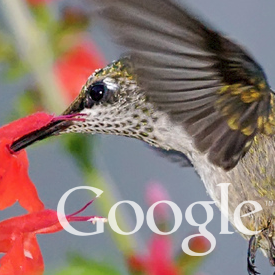Hummingbird: Google's Biggest Algorithm Change in 12 Years

Hummingbird: Google’s Biggest Algorithm Change in 12 Years
Let’s set the record straight about Hummingbird and how it affects your SEO strategy.
 SEO professionals and pretty much anyone else who does business online has been in panic mode since hearing about Google’s Hummingbird algorithm, worried that it would wreak havoc on their website rankings like Penguin and Panda did. Contrary to popular belief, Hummingbird is not an algorithm change like Penguin and Panda – it is a new algorithm altogether. Penguin and Panda are parts of a bigger algorithm, while Hummingbird is a complete replacement of the algorithm. It is the most significant change that Google has made to its algorithm in 12 years.
SEO professionals and pretty much anyone else who does business online has been in panic mode since hearing about Google’s Hummingbird algorithm, worried that it would wreak havoc on their website rankings like Penguin and Panda did. Contrary to popular belief, Hummingbird is not an algorithm change like Penguin and Panda – it is a new algorithm altogether. Penguin and Panda are parts of a bigger algorithm, while Hummingbird is a complete replacement of the algorithm. It is the most significant change that Google has made to its algorithm in 12 years.
Worried that your website rankings and traffic will take a hit because of the Hummingbird algorithm? Hummingbird launched over a month ago and most people haven’t seen a difference in their rankings. There have been very few complaints from webmasters, so if you haven’t noticed any anomalies, then you’re probably fine.
Google announced Hummingbird at a media event held to celebrate its 15th birthday on September 26, 2013. During the event, Google also announced some tweaks it made to its interface and Knowledge Graph, which has a new comparison feature and filters. Knowledge Graph is essentially an encyclopedia of 570 million concepts and their relationships. Knowledge Graph allows users to discover new information quickly and easily. Ultimately, it seems that Google wants to do with the rest of the web what it has done with Knowledge Graph.
Why Hummingbird?
Google named the new search algorithm Hummingbird because it is designed to be fast and precise. The algorithm is based on semantic search and focuses on user intent rather than individual search terms. Google is now paying closer attention to each word in a query to ensure that the whole query is taken into account rather than just some of the words.
Hummingbird was introduced in response to the increasing complexity of search queries, especially as more people speak searches into their smartphones. Search industry veteran Danny Sullivan, who attended Google’s media event, spoke with Google’s Amit Singhal and Ben Gomes afterward. Sullivan subsequently reported that Hummingbird takes Google beyond just finding pages that have matching words and actually focuses on the meaning behind the words.
Sullivan said, "[Hummingbird] may better understand the actual location of your home, if you've shared that with Google. It might understand that 'place' means you want a brick-and-mortar store. It might get that 'iPhone 5s' is a particular type of electronic device carried by certain stores. Knowing all these meanings may help Google go beyond just finding pages with matching words."
Hummingbird seems to be a part of Google’s larger strategy to become less reliant on keywords. Recently, Google made the default search experience encrypted for all users so that the search terms of these users show up as “not provided” in Google Analytics. Google also did away with its popular Keyword Tool.
How Hummingbird Affects Your SEO Strategy
Sullivan concluded that for now, there’s no need to change the way you do SEO – ranking signals that have been important in the past continue to matter. But in the near future, webmasters will probably need to provide Google with as much information about their websites as possible so that Google can understand them better. We expect Google to provide us with tools to help us do that.
Google is becoming a lot better at determining what queries and webpages mean. While keywords are clearly a less important ranking factor than before, there are over 200 ranking signals that Google’s Hummingbird takes into consideration. Use these ranking factors to gain a competitive edge when trying to get on search results pages.
Need Help with Your WEBSITE'S SEO?
efelle is a full-service web design and online marketing company that offers a complete range of SEO services that will help you take your website to the top of search. For more information about our services and how we can help you rank your site in a post-Hummingbird world, give our SEO experts a call at 206.384.4909 or fill out our online contact form.
Update:
Search Engine Land has an FAQ that’s worth reading. Key takeaways:
- The name, Hummingbird, is because this algorithm is “precise and fast”. Like a hummingbird.
- The Google Hummingbird algorithm is a month old. They just told us about it publicly.
- The last major algorithm change was Google Caffeine.
- Google Panda and Google Penguin were parts of the old algorithm, not the new one.
- The Gogle Hummingbird algorithm has a lot to do with enhancing “Conversational Search”, and how Google interacts to our search queries, especially when they’re spoken.
- SEO is not dead.
- There’s really not much that SEOs need to worry about when it comes to the Google Hummingbird algorithm.